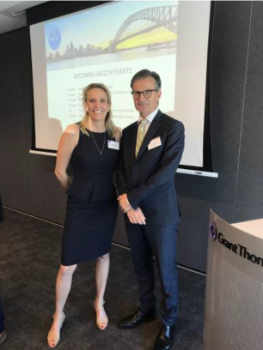Breakfast Seminar with Erik Thedéen
SACC Sydney held an engaging business seminar 16 May 2019 with special guest speaker Erik Thedéen, Director General of Finansinspektionen (the Swedish Financial Supervisory Authority) who gave us an insight to the Swedish economy today and the development in the last 10 years since the GFC.

Erik Thedéen presented Finansinspektionens (FI) role and importance in the market. FI is the equivalent organisation in Sweden to ASIC and APRA. FI supervises:
- 1,800 financial companies with authorisation from FI.
- An additional 500 registered companies in accordance with the anti-money laundering regulations.
- Accounting disclosures from 300 listed companies.
- 20,000 foreign financial firms and funds with authorisation from foreign supervisory authorities that also have primary supervision responsibility.
FI is financed by fees from companies under its supervision. These fees are determined by the Government. The companies consists of banks, credit unions, investment firms, fund management companies, insurance companies, insurance intermediaries, stock exchange and trading venues, payment service providers and consumer credit firms. FI’s main purpose is to contribute to a stable financial system that is characterised by a high level of confidence and well- functioning markets, while at the same time providing comprehensive protection for consumers.
Erik spoke generally about the economy in Sweden which is very strong at the moment with an employment growth of up to 2% on a yearly basis with a very low unemployment.
“Sweden has the highest employment rate per 100 people in the world. With these circumstances we should have a high inflation, be we don’t. There is no inflation hence very low interest rates, actually minus interest rate in Sweden. This situation with strong growth and no interest rate will encourage corporates and households to borrow as it doesn’t cost you anything. The market reacted clearly to these signals and as a result the household dept to the disposable income rose from 100-180% in the last 10 years or so. If people borrow a lot in relation to their income is fine as long as you have a job and the interest rates are low, but as soon as something hit this equation you are at high risk. What is not predicted to happen in Sweden is large credit loss within banks because of the increased household loans because typically in Sweden households pay their debt, mortgage and interest rates. Why? Because we have a social security system in Sweden which secures some kind of an income if the economy turns down and also the bankruptcy laws are pretty tough in Sweden compared to other countries.”
The house prices in Sweden has gone up more or less 100% in the last 10 years with a small drop in the end of 2017. A similar pattern as to the Australian housing market.
“People who owns a property are better off than the newcomers who can’t afford the rising property prices. Nothing happens to the economy, the productivity and long employment. The only thing that happens is that you have a large distribution effect from the insiders versa the outsiders, but this is typically not understood.”
o stabilise the market certain measures has been implemented such as stricter amortisation requirement e.g. new borrowers with mortgage loans exceeding 4.5 times gross income shall repay at least 1% of the mortgage in excess of the first amortisation requirement. To read more about the mortgage market and other presentations from Erik Thedéen and FI visit https://www.fi.se/en/published/presentations/.
Thanks to all members and guests attending this breakfast seminar and special thanks to Erik Thedéen from FI and Vincent Tropiano for hosting us at Grant Thorntons CBD venue.





Leave a Reply
Want to join the discussion?Feel free to contribute!